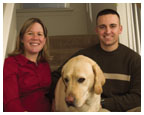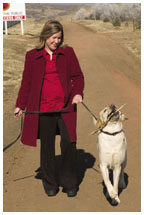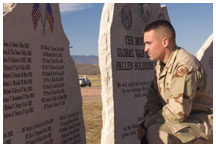February 9, 2005: Features
Bethany ’01 and Geoff ’01 Gasperini at home in Fort Carson with their dog, Custer. (Photographs by Brian Payne/Black Star) |
Home
after Iraq
The life of a soldier, and of the one left behind
By Mark F. Bernstein ’83
For Geoff Gasperini ’01, the hardest part of arriving back in the United States after a tour of duty in Iraq, and seeing his wife for the first time in a year, came on the way home from a college basketball game.
Geoff, along with the rest of Eagle Troop of the Army’s 3rd Armored Cavalry Regiment, had returned to Fort Carson in Colorado Springs last St. Patrick’s Day, the night before Princeton played in the first round of the NCAA men’s basketball tournament just up the road in Denver. Friends bought tickets for Geoff and his wife, Bethany Witmer Gasperini ’01, and the couple celebrated their reunion by cheering for the Tigers. But it wasn’t the thousands of fans slugging popcorn and soda so soon after he had escaped Army rations that got to Geoff — it was the drive home. In Iraq, American troops — especially those in Abrams tanks – had the right of way, and traffic was much slower in Fallujah than the cars zipping along the darkened interstate at 80 miles per hour.
“It was all a little overwhelming,” Geoff recalls. “I started driving home and realized it wasn’t a good idea. I pulled over and let Bethany drive the rest of the way.
Bethany and Custer on the 10K jogging trail she used to train for marathons when Geoff was in Iraq. |
In an age of an all-volunteer Army, the war in Iraq is little more than a newspaper headline to most Princetonians. But to some, like Geoff Gasperini, it is very much a personal experience. And to those like Bethany Gasperini, who remained at home and waited, the war had costs, as well.
Today, the Gasperinis live in a town house on the base, on Light Fighter Drive, not far from Just Cause Drive. It’s in a neat subdivision with postage-stamp front yards, winding streets, and children’s bikes left casually on the sidewalks. The base Burger King is just inside the entrance gates, along with a supermarket and carwash; the Rocky Mountains are visible off to the west.
Geoff Gasperini knows Army bases. His father, a West Point graduate, served in the Army’s legal corps, and his mother was a nurse in the Army Reserve. Geoff moved around the country as a child before his family settled in Richmond. Earnest and soft-spoken, he majored in history in Princeton and was quarterback and captain of the sprint football team. A self-described Army brat who didn’t mind the frequent moves, Geoff knew he wanted to continue the family tradition of service. So while his classmates mapped out plans for graduate school or careers in business or law, Geoff drilled in ROTC. It was the route to becoming an officer, and would ease the burden of Princeton’s tuition.
He met Bethany, who ran cross-crountry and track before taking up crew, through Athletes in Action and Campus Crusade for Christ, both Christian service organizations.
Geoff at a memorial to Fort Carson soldiers who have been killed in Iraq. |
Bethany says she developed a crush on Geoff and waited impatiently for him to take the hint. Geoff finally asked her to the sophomore formal, then surprised her a few weeks later by taking her to see the Christmas tree at Rockefeller Center. He proposed on the day they graduated — the day he also officially joined the Army. “I had Commencement, my commissioning ceremony, and I proposed. It was quite a big day for me,” Geoff says.
After graduation, Geoff was posted at an Army recruiting office in the Princeton armory and was there on the morning of Sept. 11, 2001. As soon as he heard that hijacked planes had struck the World Trade Center, Geoff sprinted to the Frist Campus Center, where students were watching the news solemnly. “I knew,” he recalls, “that this was going to be affecting my future.” He was right; he was soon sent to officer basic training for five months, where he learned to lead a tank squadron. Geoff and Bethany were married in the Princeton Chapel in May 2002, and after a four-day honeymoon, he reported to Fort Carson as a tank platoon leader.
With war looming, the soldiers in Geoff’s unit knew they would be among the first to go to Iraq, though no one knew when, where, or for how long. When his deployment order finally came on March 31, 2003, soon after hostilities began, he called Bethany at lunchtime to tell her he was shipping out. They said goodbye at 10 o’clock that night. Until then, Bethany “had no idea” about what Geoff’s service would really mean in their lives, she confesses. As late as Sept. 10, 2001, the Army had seemed a place to be all that you could be; a long, dangerous overseas deployment was little more than a distant risk. “I saw it as an opportunity to explore different parts of the country,” she says of being an officer’s wife. Suddenly, it was something completely different.
The 3rd Armored Cavalry Regiment massed in the Kuwait desert until April 2003. Geoff’s unit was sent to Fallujah in the second wave of the invasion and, to the soldiers’ surprise, entered the city without resistance. “The people there are very influenced by tribal relations,” Geoff says. “The local sheiks and imams kept order.”
But the night Geoff’s unit arrived, members of the 82nd Airborne fired into a crowd that had gathered outside two buildings it occupied. The 82nd then moved out, leaving Geoff and 134 other members of his regiment in charge of the city until reinforcements arrived. Shortly after those gunshots into the crowd, the first grenade attack on the American forces took place (Geoff was not at the scene) and that, he believes, was the beginning of the insurgency that coalition forces are still trying to suppress. The shooting by the 82nd Airborne — whether justified or not — became a cause célèbre among local residents. It “helped create a hostile environment in Fallujah,” Geoff says. “It gave credence to (the Iraqis’) anti-American feelings.”
Less than a week after the grenade attack, Geoff’s unit was assigned to establish a traffic control point between the main road into downtown Fallujah and the highway. “It was crazy just trying to drive a tank in city traffic,” he recalls. Geoff’s tank, leading the column, tried to turn too sharply at an intersection and one of the wheels slipped off its tread, blocking traffic in both directions. Horns began to honk as a crowd of mostly curious, but potentially hostile, Iraqis gathered to watch the stressed Americans try to repair their tank. Geoff vividly recalls one Iraqi boy who approached the soldiers and, in a mix of broken English and sign language, bravely but ludicrously asked if he and his friends could help the Americans push their 70-ton tank off to the side of the road. Though the troops were back under way within about 30 minutes, Geoff says, “a day felt like a month.”
Sent later to Ramadi in western Iraq, the regiment abandoned its unwieldy tanks and instead circulated around the city in Humvees and armored personnel carriers to “make a presence” by hunting for Saddam loyalists and caches of weapons. The soldiers returned briefly to Fallujah before moving west again, in September 2003, to train Iraqi police along the border with Saudi Arabia, where Geoff remained for the final six months of his deployment.
Dealing with the Iraqi people was the most important challenge his unit faced, Geoff says: “Soldiers have trouble distinguishing bad people from good people.” Yet the vast majority of Iraqis he dealt with were simply civilians trying to get by in a very unstable situation. “When your default reaction is ‘enemy’ and your default action is ‘attack,’ you’re going to fail,” he says. “Suppose our police did that. How would we feel?”
Back home, Bethany persevered during Geoff’s absence. “You have a mission, too,” she says of being a military spouse, “and it’s to stay as focused as you can.” She felt lucky to have a full-time job teaching high school biology and oceanology, which helped keep her mind occupied. She also trained for two marathons, often dragging the couple’s yellow lab, Custer, along with her. “The dog trained a lot, too,” Bethany jokes. She avoided direct conversation about Geoff’s absence or what might happen to him, but there were painful reminders. One day she was going through some desk drawers and came across Geoff’s will.
Like many other military spouses, she avoided reading or listening to the news. “If you’re having a bad day, you don’t want to hear that five people were blown up by a roadside bomb,” Bethany explains. She stopped watching television, knowing that reports were not always accurate and did not necessarily pertain to Geoff’s unit if they were. “We had to be our own filters, and the easiest way was to turn off the TV,” she says.
The official information she received tended to be bubble-wrapped in generalities. No one could give the families a definite date for the troops’ return. The troops themselves didn’t have an answer, and the short deployment Geoff and Bethany hoped for stretched into seven months, then eight months and beyond; it would be a year before Geoff returned. The Gasperinis wrote to each other almost daily, but mail service was terrible at first, and Bethany went for two months without hearing a word from her husband. In his letters, Geoff kept the tone light. He recounted amusing stories — such as the time he stopped a car at a checkpoint because of suspicious figures in the back seat, only discover that the “figures” were three sheep, with three more stuffed in the trunk. Describing the open shelter in which he had lived for several weeks, Geoff reported, “We get windows and doors today!” He neglected to mention the nights he spent sleeping on the hood of his tank or the brutally hot daytime temperatures of a Fallujah summer.
Very early one morning, about two months after he had shipped out, Bethany was in bed in Colorado when the phone rang. It was Geoff, using the two minutes allotted to him for a call to tell Bethany that he was safe and wish her good luck in an upcoming marathon. “I was half asleep, but I woke up pretty quickly,” she says. “We had time to exchange the ‘I love you’s.’”
For support, Bethany turned to wives in her neighborhood, several of whom also were teachers or who shared her strong religious faith. The friendships and conversations provided a “lifeline throughout the deployment,” she says. She also helped to revive the unit’s Family Readiness Group (known simply as an FRG), first leading 125 families of men in Fox Troop, Geoff’s original unit, and moving to lead the families of the Eagle Troop readiness group when Geoff was reassigned during his tour of duty. Once a month, she organized potluck dinners and set up conference calls with the troop commander to get the latest information from the field. Sometimes she served as a friend, sometimes as a counselor, sometimes as a conduit for information. Unlike many other aspects of base life, the groups mix families of different ranks; Bethany remembers the wife of one enlisted man telling her, “You’re the nicest lieutenant’s wife we’ve ever had.”
The most personal service a group leader can provide is assisting a wife whose husband has been killed in action. Bethany seemed always one step removed from catastrophe; Fox Troop lost its commander shortly after Geoff was reassigned to Eagle Troop, which had lost three men just weeks before. Bethany and other wives delivered meals to the widows and their families. “You’d hear about a casualty in the regiment, but it would be in another squadron,” Bethany says. “But you’d know someone was experiencing the worst kind of pain.”
The low point of the Gasperinis’ separation came in mid-November 2003, the eighth month of Geoff’s deployment. Bethany and her neighborhood friends had been to the movies to see the romantic comedy, Love, Actually. It was, she believes, the first time she realized how long Geoff had been away — and how long she had to wait for a reunion. “Though we were more than halfway [through Geoff’s anticipated tour of duty], we still had such a long time to go until he returned,” she says.
Although she had heard rumors of Geoff’s return throughout the winter of 2004, when Bethany was officially notified — on the morning of the day he was to arrive — she was too numb to react with tears or shouts. “It was very difficult to get excited,” she says. “I had closed off my emotions to that.” Groups from the 3rd Armored Cavalry Regiment marched into the amphitheater at Fort Carson that night as Toby Keith’s “An American Soldier” played in the background. It was impossible to pick Geoff out of the hundreds of soldiers on the floor, but Bethany waved a sign with a smiley face to help him find her. Since then, the transition has been easier than expected, Bethany says, noting that Geoff is able to laugh more now: “I’ve told him he has a better sense of humor.”
Two months after returning, Geoff was back at Princeton for the commissioning ceremony of new ROTC graduates. At the ceremony, President Tilghman called the new officers a “true embodiment” of Princeton’s commitment to public service. Geoff spoke, too. He noted the failures of leadership in the Abu Ghraib abuse scandal, and said that soldiers today should “seek to influence by the strength of character rather than strength of force.”
Geoff’s job now is to prepare the soldiers who will go next. He meets with unit commanders to determine what skills the forces will need, then designs training exercises to help teach them what they must know. Riding around the base in late fall, Geoff passes soldiers manning mock checkpoints; the men stop civilian vehicles filled with other soldiers, playing Iraqis, to learn to distinguish friend from foe. Training for urban warfare has become a priority. A collection of empty buildings, which once had been set up as a Bosnian village, now serves as a mock Iraqi village. Training raids are videotaped and, much like football players, troops spend hours afterwards studying the film to see what they did wrong.
Geoff believes that soldiers going to Iraq now will be better prepared than he was — he went without a Kevlar vest for the first three months of the war, and Humvees were not armor-plated. Soldiers did not know the language, and there were few interpreters available. But some things — the realities of urban warfare, for example — you can’t absorb on a training ground in Colorado.
And though American soldiers are better prepared now, Geoff hopes not to return to Iraq with them. Recently promoted to captain, he was planning to leave the Army next summer, and already had mailed his law-school applications. Under the Army’s stop-loss program, however, his service has been extended for another year. He expects to spend the year as a rear detachment commander, providing command assistance for his unit when it is overseas — able to remain at Fort Carson, close to Bethany and the baby she is due to deliver later this winter. But he and Bethany are also preparing for the possibility that he will be called to Iraq again. And when he leaves active duty, he will owe the Army three more years of service in the Reserve.
“Part of me wants to go back with (my soldiers),” Geoff says. “After you’ve been through all that, you’ve got bonds. For all the hardships, you feel like you’ve accomplished something. And when you’ve trained with these guys, it’s hard to see them go over and you’re not. But I want to get on with my career, too.”
Asked how his time in Iraq has affected his view of America’s role in the world, Geoff does not answer at first but then, after thinking it over, responds in an e-mail. “Americans tend to believe that everyone in the world thinks the same way we do and shares all the value systems we champion,” he writes. “There are some universal values, yes, but there are also significant differences due to religion, culture, and history. We will struggle to remain an admired and peacefully influential nation if we fail to recognize these differences when formulating the ways in which we interact with the peoples and nations of the developing world.”
Law school and the Gasperinis’ future remain on hold for at least
another year. As a hand-painted sign above the doorway of their tidy town
house reminds them: “Home is where the Army sends you.” ![]()
Mark F. Bernstein ’83 is PAW’s senior writer.




